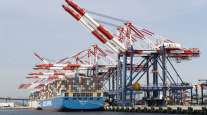Bloomberg News
Biden to Visit Busiest US Port as Union Talks Raise Risk of a New Logjam

[Stay on top of transportation news: Get TTNews in your inbox.]
President Joe Biden’s administration is trying to avert another inflation-spawning logjam at the nation’s busiest seaport, just as the economy is starting to recover from the last one.
Biden will visit the port of Los Angeles on Friday with the White House closely watching talks on a new union contract for 22,000 West Coast dockworkers. A collapse of the negotiations risks a work stoppage during the port’s busiest time of year, one that would snarl U.S. supply chains still suffering pandemic disruptions.
The International Longshore and Warehouse Union and the Pacific Maritime Association, which represents more than 70 terminal operators and ocean carriers, are negotiating in San Francisco over a contract for workers at 29 ports in California, Oregon and Washington. The current pact expires July 1.
The president and his administration have helped since last year to reduce massive backlogs at the twin ports of Los Angeles and Long Beach that contributed to inflation across the U.S. Together, the two ports handle the most container traffic in the country.
“We’re in much better shape, but we’ve still got a lot of work to do,” said Gene Seroka, executive director of the Port of Los Angeles. Now, he said, the labor talks are “front of mind for many in the industry.”

Seroka
Biden has directed Cabinet members and supply chain experts to smooth negotiations between the ports and dockworkers in hopes of avoiding a repeat of the monthslong disruptions that followed a 2014 labor dispute.
“We know the impacts if it doesn’t go well,” Labor Secretary Marty Walsh said last week. “But I feel confident where they’re headed on those conversations.”
Highlighting the stakes, Biden will discuss the latest data on U.S. inflation while at the port and argue that cutting shipping costs will curb price increases, a White House official said. The Labor Department will issue a report on changes to consumer prices in May before his arrival.
Biden released a video this week criticizing “outrageous” sea shipping costs and called on the House to clear Senate-passed legislation overhauling the industry.
“Inflation is a problem. This won’t solve it all but it’ll solve a big piece of it,” the president said in the video.
‘Most Important’ Negotiation
It took the shipping industry about another nine months after a labor deal was reached in February 2015 to return to normal service, according to an analysis by Copenhagen, Denmark-based Sea-Intelligence.
This time around, the labor talks take place as the U.S. recovers from an unprecedented supply chain crisis sparked by the COVID-19 pandemic. At stake in the negotiations is no less than the recovery of the world’s largest economy, already dealing with the most pernicious inflation in four decades, shortages of products ranging from baby formula to air conditioner parts and growing fears that another shock could tilt the country into a recession.
Retailers, their suppliers, and 20 Republican senators have urged the administration to engage in the talks to ensure the needs of both workers and the ports are met and further backups, delays and inflationary costs are avoided.
The visit underscores the White House’s push to smooth out supply chain crunches that have fueled soaring inflation.
“People are very much aware this is probably the most important contract negotiation these two groups have had in forever,” PMA President Jim McKenna said before the talks started May 10.
Both parties have repeatedly vowed to reach a deal without disruptions. If they don’t, Biden could be forced to decide whether to invoke the Taft-Hartley Act, a Cold War-era law that allows the government to call for an 80-day cool-down period amid labor impasses, among other anti-union provisions.
Disruption Concerns
George W. Bush relied on the legislation to reopen West Coast ports in 2002 when PMA locked out workers for 10 days after a series of work slowdowns that was estimated to have cost the economy $1 billion daily. When ILWU carried out the longest strike in U.S. longshore history for 130 days in 1972, Richard Nixon did the same.
The union hasn’t gone on strike since then, and is less likely to do so with a pro-labor president sitting at the White House, said Stephanie Loomis, vice president of international procurement at freight forwarder CargoTrans Inc.
Want more news? Listen to today's daily briefing above or go here for more info
“The union is going to think twice, if not three times, before striking or doing something really drastic, because they don’t really want to force Biden’s hands to enact the Taft-Hartley Act,” she said.
ILWU International President Willie Adams, who was invited to the White House in October, said ahead of the talks that “never before have we had a president that says ports are a priority.”
Biden has committed billions of dollars to boost port infrastructure, he said, and has tapped Cabinet members including Walsh and Transportation Secretary Pete Buttigieg to guarantee operations run smoothly.
“He’s made a commitment like no other,” Adams said.
The labor talks are unfolding at a moment of unusual clout and vigor for the long-declining U.S. labor movement. In the seven years since West Coast port workers have negotiated a full, fresh contract, the hardships of laboring through the COVID-19 pandemic, employers’ recent robust profits and the rapid acceleration in inflation could drive up ILWU members’ expectations for winning substantial raises.
“This president has made no secret about his love affair with big labor bosses,” American Trucking Associations President Chris Spear said. If a strike happens, “this could certainly move us into recession in a matter of weeks. So he’s got to calculate this very carefully."
With assistance from Josh Wingrove and Josh Eidelson.




